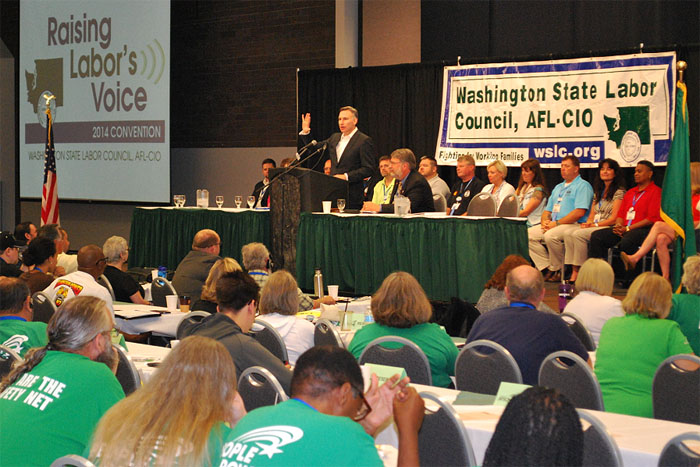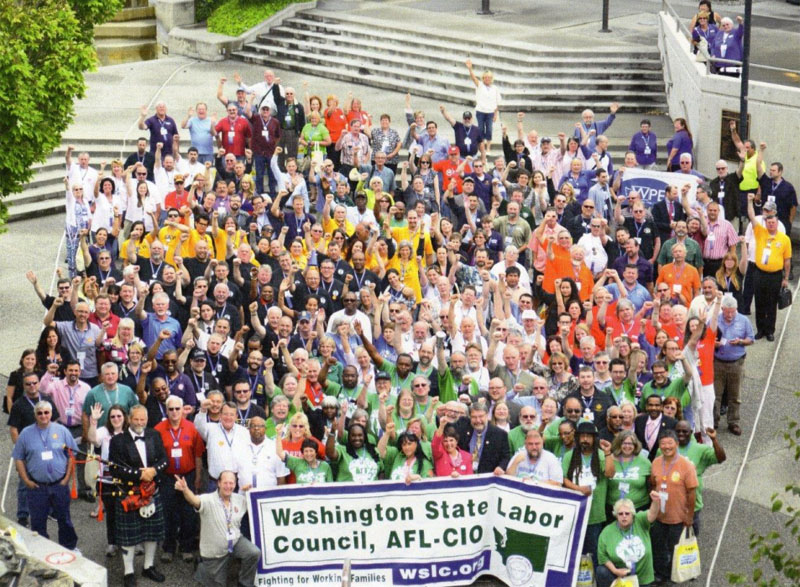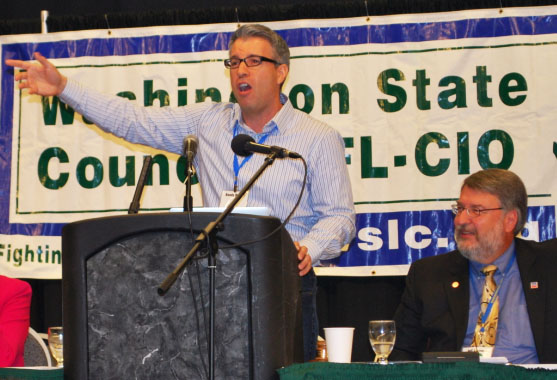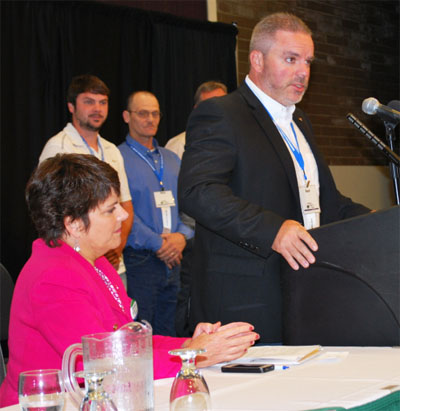W.S.L.C.
WSLC Convention: Challenges, inspiration
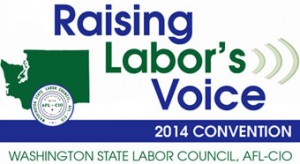 WENATCHEE (July 24, 2014) — The final day of the Washington State Labor Council’s 2014 Convention featured brief presentations by Ramon Torres, President of Familias Unidas por la Justicia, the boycott of Sakuma Brothers berries and farmworkers’ struggle to get a fair contract there; Estakio Beltran, who has received the WSLC’s endorsement in his campaign for Congress in Washington’s 4th District; and representatives of Working America explaining their successful and ongoing efforts to enroll members here in Washington state into the AFL-CIO’s community affiliate for workers without a union.
WENATCHEE (July 24, 2014) — The final day of the Washington State Labor Council’s 2014 Convention featured brief presentations by Ramon Torres, President of Familias Unidas por la Justicia, the boycott of Sakuma Brothers berries and farmworkers’ struggle to get a fair contract there; Estakio Beltran, who has received the WSLC’s endorsement in his campaign for Congress in Washington’s 4th District; and representatives of Working America explaining their successful and ongoing efforts to enroll members here in Washington state into the AFL-CIO’s community affiliate for workers without a union.
But the majority of Thursday’s action was devoted to WSLC delegates’ debate and passage of resolutions that establish the WSLC’s policies and priorities in the coming year. The final resolutions, as approved by delegates, will be posted at the WSLC’s website next week.
WENATCHEE (July 23, 2014) — Day 2 of the Washington State Labor Council’s 2014 Convention was highlighted by two dynamic speakers who both urged delegates to fight efforts to divide-and-conquer workers — in both the private and public sectors — by changing the way we think, strategize and act.
Surita Gupta, Executive Director of Jobs With Justice, told the hundreds of convention delegates assembled at the Wenatchee Convention Center that the changing nature of work means that unions must adapt and forge new community partnerships to fight for better working and living standards.
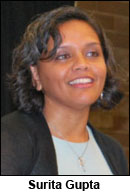 “The nature of work has changed. The prominence of contingent work — work that is subcontracted, precarious and part time — poses a major threat,” Gupta said, adding that many workers today aren’t even sure who their real boss is, much less have the power to negotiate better working conditions with that employer. “We must confront corporate power in new and creative ways to expose who the real boss is.”
“The nature of work has changed. The prominence of contingent work — work that is subcontracted, precarious and part time — poses a major threat,” Gupta said, adding that many workers today aren’t even sure who their real boss is, much less have the power to negotiate better working conditions with that employer. “We must confront corporate power in new and creative ways to expose who the real boss is.”
She listed several examples of successful community and labor partnerships, including pressuring Walmart to change its policies for pregnant employees and a new effort to establish “prevailing wages” for retail workers in San Francisco. Gupta also listed the successful efforts to raise the minimum wage to $15 in both SeaTac and Seattle.
“These are building blocks for transformative change,” she said. “I hope some of these examples inspire you and help you embrace the huge opportunities before us to develop a next generation set of workers’ rights policies.”
Also Wednesday, Dow Constantine told convention delegates that ever since he was first elected King County Executive in 2009 and inherited a recession-era budget mess, conservative forces have fought to blame public employees for the challenges faced in government. He has aggressively fought that mindset and believes his efforts to show due respect to county employees and engage them in solving problems has paid off for the people of King County.
“Public employees are not the problem,” Constantine said. “They are working hard every day to provide services and infrastructure that the people of our county want and need. Not only are out workers not the problem, they are the solution… We changed the way the county does business by partnering with our county employees rather than demonizing them.”
Meanwhile, Constantine criticized the “coalition of inaction” in the Republican-controlled State Senate that has caused a transportation funding crisis in communities across Washington, including King County.
In other convention action on Wednesday:
Union Values panel — At past conventions, some union delegates — especially new ones — have requested explanations of some fundamental labor standards and values because they involved issues in industries they weren’t familiar with. So this year, WSLC Jeff Johnson asked representatives of several affiliated unions to briefly talk about some standards in their industries and the union values behind them.
Karen Strickland of AFT Washington explained the importance of tenure, especially amid public disinvestment and privatization in higher education.
Dave Myers of the Washington State Building and Construction Trades discussed prevailing wage laws and the continuing efforts of Republicans in the Legislature to chip away at those standards so that construction workers on public works projects will earn lower wages.
Nicole Grant of the Certified Electrical Workers of Washington talked about apprenticeship, describing her personal experience as an IBEW Local 46 apprentice and the value of earning while you’re learning.
Larry Brown of Machinists District 751 explained why seniority is so important to guard against management manipulation of staffing to jettison older and more experienced, but more costly workers. (“Old saying: seniority sucks until you have it.”)
Alia Griffing of Washington Federation of State Employees (WFSE), AFSCME Council 28 talked about outsourcing of public services and how Washington’s competitive contracting statute gives employees the right to present alternatives and bid to keep their own work — “a win-win for taxpayers” — but advocates of privatization try to deny state employees that right.
Lee Newgent of the Seattle Building and Construction Trades Council described Project Labor Agreements, where management gets the assurance of no strikes on major projects like stadiums or Sound Transit in exchange for uniform work rules, apprenticeship utilization standards, and efforts to ensure workforce diversity.
Matt Zuvich of WFSE Council 28 explained the importance of defined-benefit pensions, noting that these plans should not be considered some “gold standard,” but should be the expectation of all Americans who have led long and productive worklives and deserve to retire in dignity.
20 Years After NAFTA – Stan Sorscher of the Society of Professional Engineering Employees in Aerospace moderated a panel on international trade agreements. He said that “free trade” policies were considered the conventional wisdom in 1993 when the North American Free Trade Agreement was signed and critics who complained about the deterioration of labor and environmental standards had the burden of proof. Now with 20 years of evidence, skeptics has been validated and the burden of proof has shifted to the negotiators of these bad agreements.
Larry Brown of Machinsists District 751 explained that all Boeing workers know the importance of trade given that Boeing is the No. 1 factory exporter in America, accounting for 10% of all U.S. exports on its own. But American workers are seeing diminishing returns from that success as 787 wings are outsourcing to Japan, tails to Italy, engineering to Russia, etc. All of this offshoring has resulted in quality issues for Boeing, the loss of American jobs, and loss of profit for company.
Gillian Locascio of the Washington Fair Trade Coalition explained the Trans-Pacific Partnership agreement, now being negotiated in secret, that will cover about 40% of global market, including 12 Pacific Rim countries and other nations that choose to join later. She said:
The public has had to resort to Wikileaks to find out what is being proposed in our names, while some 600 corporate trade advisors have full access to the negotiating texts. That means representatives of companies like Walmart, Boeing, Monsanto, and Chevron. Our jobs, our regulations, our democracy is on the table.
Do you trust Walmart to negotiate international labor protections for you? Neither do I.
Brenda Wiest of Teamsters Local 117 talked about the impact of free-trade agreements on food safety, as many food processing jobs have been offshored and only 1.8% of food imports are now tested by inspectors. But she also noted that public safety advocates can successfully oppose dangerous free-trade policies like NAFTA’s opening of highways to international truckers. That policy has been successfully fought in the years since NAFTA over safety and environmental concerns.
Ty Pethe, President of WFSE Local 304, described how participating in the Seattle WTO protests in 1999 as a high schooler (editor’s note: !!!) was a formative experience in his understanding of the important of standing up for fair trade.
Comprehensive Immigration Reform & Naturalization panel: Rich Stolz of OneAmerica urged delegates to look past the rhetoric and politicization around the current humanitarian crisis of unaccompanied children from Central America migrating into the U.S. Instead, he urged delegates to keep their eyes on the prize — comprehensive immigration reform — and to hold Congressional representatives accountable for their failure to act.
Randy Parraz, Western Coordinator for the AFL-CIO GOLD Team, said that helping immigrants who are already here and eligible for citizenship to negotiate the naturalization process is a huge opportunity for labor organizations to build power.
“If labor becomes the Ellis Island of this century, the point of contact for the immigrant community to gain citizenship, imagine the impact we could have,” he said, urging delegates to reach out to immigrant communities, embrace them and make them part of our labor families.
Awards — Several awards were presented Wednesday to individuals and unions for their outstanding work over the past year:
MOTHER JONES AWARD — The WSLC Economic Development, Job Retention, and Transportation Committee presents Mother Jones Awards to the individual and union that best exemplify the tradition of Mary “Mother” Jones’ immortal statement, “Mourn for the dead, but fight like hell for the living!” This year’s recipients were IAM District W-24 and the workers at the Bradken foundry in Chehalis who finally achieved a first contract after a two-year struggle, and Shannon Ryker of IAM District 751 who was inspired by her opposition to Boeing’s concessionary contract demands to create new ways for members to discuss, debate and speak out on such issues, including the Rosie’s Machinists page on Facebook.
PRESIDENT’S AWARDS — WSLC President Jeff Johnson presented an unprecedented four awards to commemorate major success stories achieved by the labor movement in the past year. Receiving the honors were David Freiboth, Executive Secretary of the M.L. King County Labor Council, for his role in holding together the union coalition that supported the successful $15 minimum wage ordinance in Seattle; Jonathan Rosenblum, Campaign Director of Working Washington, for his leadership role in the development and passage of the $15 minimum wage proposition in SeaTac; UFCW Locals 21 and 367 and Teamsters Local 38 for their successful campaign to fight grocery employers’ efforts to take away affordable health care benefits and to achieve a fair contract; and IAM District 751 for their inspiring solidarity in the face of pressure from Boeing, politicians, the public and their own international union to accept contract concessions in order to secure 777-X work here in Washington state.
ALSO see Day 1 coverage of the WSLC Convention — Convention: Climate change, ACA and more

